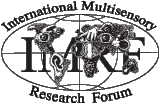The effects of linguistic labels related to abstract scenes on memory
Last modified: 2011-09-02
Abstract
Boundary extension is the false memory beyond the actual boundary of a picture scene. Gagnier (2011) suggested that a linguistic label has no effect on the magnitude of boundary extension. Although she controlled the timing of the presentation or information of the linguistic label, the information of stimulus was not changed. In the present study, the depiction of the main object was controlled in order to change the contextual information of a scene. In experiment, the 68 participants were shown 12 pictures. The stimulus consisted pictures that depicted the main object or did not depict the main object, and half of them were presented with linguistic description. Participants rated the object-less pictures more closely than the original pictures, when the former were presented with linguistic labels. However, when they were presented without linguistic labels, boundary extension did not occur. There was no effect of labels on the pictures that depicted the main objects. On the basis of these results, the linguistic label enhances the representation of the abstract scene like a homogeneous field or a wall. This finding suggests that boundary extension may be affected by not only visual information but also by other sensory information mediated by linguistic representation.
References
Gagnier, K.M. (2011). Rethinking boundary extension: The role of source monitoring in scene memory, (Doctoral dissertation). Retrieved from ProQuest Dissertations and Theses. (Accession Order No. [3440469])


